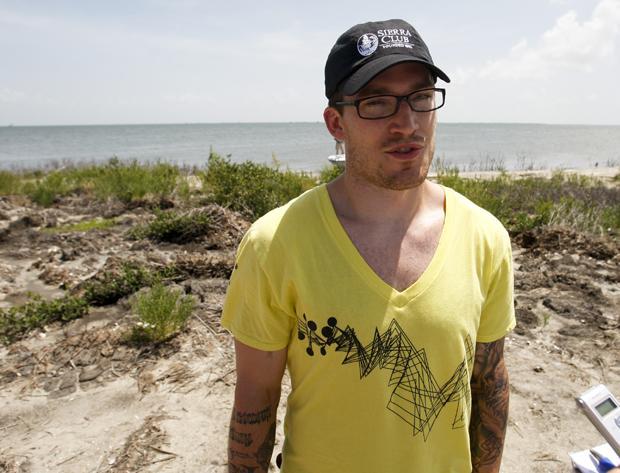Advertisement
Athletes On Gulf Tour Lament Scale Of Oil Spill

Atlanta Falcons fullback Ovie Mughelli stood in a small sport fishing boat, holding up his phone to photograph dying marsh grass that was stained a glistening black and had bent under the weight of crude oil.
"That's terrible," he muttered to himself, shaking his head.
Mughelli was among 10 current and former pro and Olympic athletes who toured areas around Louisiana's Barataria Bay on Tuesday, hoping to learn more about the BP oil spill and keep attention focused on the work that must be done to restore some of the most productive wetlands in America.
Also on the boat tour, which was sponsored by the Sierra Club, were Boston Bruins defenseman Andrew Ference and his wife, former X Games snowboarder Krista Bradford Ference; race car driver Leilani Munter; former New York Rangers and U.S. Olympic squad goaltender Mike Richter; former Tampa Bay Buccaneers fullback Mike Alstott; former women's tennis star Chanda Rubin; 2006 and 2010 Olympic alpine skier Stacey Cook; 2008 Olympic hammer thrower Loree Smith; and 1988 Olympic race walker Gary Morgan.
They saw miles of absorbent boom placed along the edges of canals or ringing Pelican nesting grounds. In many spots, the boom may have slowed, but did not stop, the oil from penetrating the marshes that serve as a breeding ground for so much sea life here.
They saw oyster boats, shrimp boats, charter fishing vessels and air boats all working to clean and protect the marsh, the only work they can do now that much of the area has been closed to fishing.
"My first impression is the vastness of the problem," Mughelli said. "It doesn't look small on TV by any means, but it seems like you can contain it ... and that's not the case at all. Especially when you come out here and look at it and see the oil on the Gulf and see the marsh being eroded and see the birds with black underbellies, you realize it's a lot worse than you think it is."
Many of the athletes on the tour had already begun to build a resume of environmental activism. In his home state of South Carolina, for example, Mughelli runs a football camp in which participants learn about things like recycling in addition to football.
Advertisement
"I've tried to figure out ways to use my sports celebrity to get kids excited about going green," he said.
Andrew Ference said he hoped the attention he and fellow athletes bring to the oil spill will spur more public discussion about whether there's an appropriate balance of industrial and environmental concerns in American society.
"The stuff on a personal level is good and it's important that people take those steps in their lives, but it's absolutely pointless without corporations, without government, doing the large-scale things," Ference said. "We have to take a hard look at ourselves. Coming down here personally, when you talk to the people, you see the (marsh) grass, you see the oil - that hits home."
The leak began after the Deepwater Horizon offshore drilling platform exploded on April 20, killing 11 workers. As of Tuesday, the 84th day of the disaster, between 90.4 and 178.6 million gallons of oil had spewed into the Gulf.
Richter called the scale of the problem "hard to imagine," and said he hoped the athletes' visit would work against any "oil spill fatigue" that may cause the general public to start tuning out news about the leak after nearly three months.
"The fishing industry has been harmed, some people irreparably. The ecology has really been turned upside down here," Richter said. "Really I think what dawns on you is the only way to keep these places clean is to prevent it in the first place. You're talking about hundreds of square miles. The damage has been done and will continue on every moment that we go without this thing capped."
Rubin, a Louisiana native who still lives in Lafayette, said even she could not appreciate the magnitude of the spill until she saw it herself.
"You come out here and you see how it is actually affecting the wildlife and the marshes, the scenery, everything that we kind of associate with part of Louisiana, with the culture," Rubin said. "Seeing the oil weighing down some of the marshes and some of the greenery already dying, you just don't get the full effect until you see it in person."
This program aired on July 14, 2010. The audio for this program is not available.